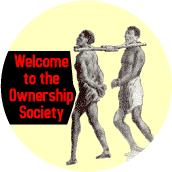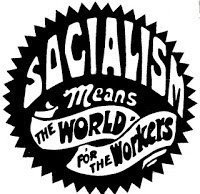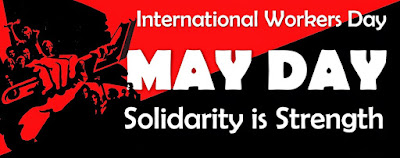What is liberation? The words which need most careful use are, usually, those which are thought to be above it. George Orwell continually talked of brotherhood, justice, decency and so on without ever giving specific meanings: they spoke for themselves. A minute's thought over the everyday corruptions of those terms will show that they do nothing of the kind. Freedom is another. Assumed to be self-explanatory, it is all things to all men: hope, delusion, inducement, trap. Freedom is the natural — and immediate — concomitant of the establishment of socialism. Nor is any abstract judicial freedom meant. The economic condition of socialism, production for use. means free access by everyone to the material wealth of society. That is emancipation. and from it arises the freedom to choose the sort of life one wants.
Even if all workers owned their own homes, capitalist society would remain class-divided: the majority forced to live by selling their ability to work for a wage or salary and a minority of owners of the means of production living off unearned income in the form of rent, interest or profit. When socialists talk about inequality of property ownership being the basis of capitalist society we mean ownership of the means of production, of land, raw materials, factories, machines and other instruments for producing wealth. Owner-occupied houses are not means of production; they are not, and cannot, be used to produce more wealth. In this sense they fall into the same category as cars, washing machines and other household goods; they are consumer goods, means of consumption — workers have to consume accommodation, be it owned, mortgaged or rented, in order to keep themselves fit to work. Homeowners, therefore, are not capitalists and neither do they have any interests in common with capitalists. This important distinction between property in means of consumption (houses, cars, household goods) and property in means of production, or capitalist property, is lost in the statistics of property ownership. Owners of capitalist property are, quite literally, in a different class from owners of means of consumption. To gain entry into this class you need to own a lot more than your home. Owning your own home in no way frees you from having to go out and sell your ability to work for a wage in order to live. Workers who own, or who have mortgaged, their home have to sell themselves on the labour market just as much as workers who live in council houses or private rented accommodation. Homeowners remain non-owners of the means of production and so remain members of the working class, with the same interests as wage earners have always had under capitalism: to establish a system based on the common ownership and democratic control of the means of production and to press, while capitalism lasts, for higher wages and salaries. Home ownership does not give workers an interest in the continuation of capitalism.
The socialist transformation of society entails the dispossession of the minority capitalist class of their ownership and control of the means of wealth production and distribution. All of their lands and factories, mines, media and transport will be taken away from them. The machinery of production will become the common property of society.
In order for the capitalists to be dispossessed — or "the expropriators to be expropriated", as Marx put it — there is one prerequisite. The working class, who produce all the wealth and constitute a majority of society, must be conscious of what they are doing. The dispossession of the capitalists cannot be carried out by a politically ignorant workers, and nor can the task be performed for them by enlightened leaders. As The Socialist Party's Principles make clear, the emancipation of the working class must be the work of the workers' themselves. If the social transformation is carried out in an organised fashion by people who know what they are up against and what they want to establish as an alternative, then what can stop us?
A majority of politically conscious workers must democratically gain control of the state machine, which in this country means the conquest of parliament and local councils. The revolutionary mandate for such political action will not be like any given to MPs or councillors in the past. Socialists will enter the state bodies as delegates, not representatives or political leaders. They will be accountable for every move of the socialist movement and their sole purpose in entering the state bodies will be to abolish ruling class power. They will formally enact the abolition of class ownership, and in doing so will express the wishes of millions who have voted for socialism and nothing less.
It is crucial that the state, which controls the means of coercion including the police and armed forces, is not left in the hands of the capitalists it represents. But unlike previous contestants for state power, the working class will not seek to establish its own state: a workers' state or a socialist state. These are absurd notions. As Engels pointed out, the workers' conquest of state power will be the last act of the state. The state will be dismantled. Government over people will be replaced by the administration of things. A classless society, which will exist the moment that the capitalists are dispossessed and the means of wealth production and distribution are commonly owned and democratically controlled, must be a stateless society The Socialist Party rejects the suicidal tactic of insurrection. The idea of a minority taking up arms and shooting their way to socialism is foolish and dangerous. Even if the insurrectionaries won, they would be forced to become dictators over those they will have “liberated" against their will. The sorry history of Leninist coup d'etats is sufficient proof of that. If insurrection is advocated by those who envisage majority support for the socialist revolution, then why fight it out when we have available to us the far simpler method of expressing our decision? After all, if a majority cannot be persuaded to vote for socialism it is going to take even longer to persuade them to join an army and fight for it.
But what if the minority does not accept the majority will? We know very well that it is in the capitalists' interest to preserve their privileges against what they see as the unreasonable demands of wage slaves who ought to know their place. In The Communist Manifesto Marx predicted that some enlightened capitalists will come over to the side of the socialist revolution. Indeed, some might. They may recognise that a classless society will be better than the jungle system in which they are forced to behave as king brutes. Other capitalists may come over out of cowardice, realising that if the game is up it is better to be on the side of change rather than make enemies of the workers when we take power. So, some capitalists might support socialism. Others, who hate and detest what is happening, will just face up to the fact that the workers are in a majority and it would be futile to do anything but surrender. In short, they will take it lying down. After all. they have been "taking it" in this position for most of the history of capitalism.
But what about those who resist? How would a socialist majority deal with a recalcitrant minority? This minority may not only comprise capitalists: there may well be workers too who will be conditioned enough to retain loyalty to their dispossessed masters. Of course, there will be immense social pressure by the millions who constitute the socialist majority for the non-socialists to give the new system a try. Production solely for use and free access to all goods and services will be very powerful temptations to those who oppose socialism. There may still be some non-socialists who cannot bear the thought of living in a society of human co-operation. Well, would it be beyond the realm of possibility for socialist society to set aside some areas for these perverse characters, in which they could continue to live as if capitalism were still existence. They could exploit each other, tell lies to one another, dominate, submit... It would be hard explaining such eccentricity to children born into a socialist society, but as long as the non-socialists kept to themselves and were free to join the rest of the community should they wish, what would be wrong with that?
A recalcitrant minority might wish to carry the capitalist ethic of "To Hell With The Majority" all the way. What if they tried to use force to defeat the will of the socialist majority? By doing this they would be declaring themselves enemies of society. Only those prepared to accept the democratic will would be entitled to the community’s support. Such recalcitrants would have to be denied the freedom to operate. If they tried to form a counter-revolutionary army it would be starved into impotence. The right of free access would be denied to violent anti-democrats who. without petrol for their transport, without a munitions industry to provide them with bullets or bombs, would be brought to their knees in next to no time. If — and we here go further into the realms of hypothesis — anti-socialists tried to use violence against the socialist community, then they would have to be forcibly restrained. Without doubt, a socialist majority could never stand by while the violent tactics of the abolished capitalist system ruined socialism. As a last resort, the undemocratic minority would have to meet the fate which it will have created for itself; it would either surrender or be eliminated. We stress, however, that it will be much easier for a recalcitrant minority to be defeated by denying it access to the means of struggle, and that it will find it extremely hard to operate in conditions where the majority of people consciously oppose all that it stands for.
,
Compare the position of such a minority with that of today's undemocratic terrorists. The latter find it very hard to exist because most workers do not want to know them; many are willing to shop them to the police and most would refuse to endorse their acts of violence. But modern terrorist groups operate in easier circumstances than a violent, recalcitrant minority in a socialist society would. Under capitalism most workers are discontented. While they may not support terrorism, they might not be disposed actively to oppose it. In a socialist society anti-democrats would be up against determined men and women who, after centuries of class struggle, have gained control of society. Is such a community of socialists likely to accept defeat by a gang of arrogant ex-capitalists and deluded ex-wage slaves?
Opponents of socialism will have every opportunity peacefully to advocate the case against the new social system. If they are crazy enough they can argue for the restoration of capitalism, reminding workers of the good old days when nuclear weapons abounded and the corpses of malnourished children scattered the earth. It will not be in the interest of socialist society to ban ideas; those which conflict with material reality will be rejected, just as socialism, being in line with material reality, is on the agenda to succeed.
In a socialist society, those who used to be capitalists will be free to live as social equals. They will be members of the community, expected to give according to their abilities and to take according to their self-defined needs. Some of them have very few abilities at the moment, as a result of a lifetime of parasitism; but if you can train a parrot to say its name, you can show an ex-millionaire how to do some socially useful work. In a socialist society, humans will, for the first time in hundreds of years, be brothers and sisters: members of a free and cooperative society. Such freedom and cooperation will be difficult to want to fight against, much as they are hard to comprehend now by those who can only conceive of society as a collection of warring factions. That stage of history will be transcended with the establishment of a stateless socialist community, and the age of gunfire will have passed.







